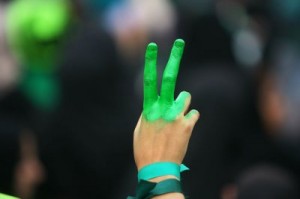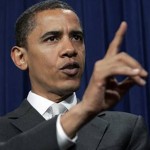The Latest from Iran (25 January): Who Makes A Move Today?
 Monday, January 25, 2010 at 19:28
Monday, January 25, 2010 at 19:28  2145 GMT: The Karroubi Story. We've worked tonight through the stories, the rumours, and possibilities to post an interim analysis of Mehdi Karroubi's statement today on "Mr Khamenei" and Mahmoud Ahmadinejad, "the head of the government of the regime".
2145 GMT: The Karroubi Story. We've worked tonight through the stories, the rumours, and possibilities to post an interim analysis of Mehdi Karroubi's statement today on "Mr Khamenei" and Mahmoud Ahmadinejad, "the head of the government of the regime".2140 GMT: In Case You Missed It. Persian2English reports: "Abolfazl Eslami, former Counselor of the Iranian Embassy in Tokyo, writes that he has decided to join people’s movement in light of the Islamic Republics’ violence and oppression."
1955 GMT: And on the Clerical Front. Ayatollah Bayat-Zanjani has renewed his criticism of the regime, asking Iran's leaders to do "nahy az monker" (repent from the bad way).
1945 GMT: Remember the Economic Front? Most of the management of Bank Melli have been replaced.
1935 GMT: We are hoping to have a thorough, on-the-mark analysis, from an EA correspondent with excellent sources, of the Karroubi statement about 2130 GMT. (To be blunt, I got it wrong earlier today, but I think, thanks to a lot of help, we'll have the best possible reading by the end of tonight.)
NEW Iran Special Analysis: What Karroubi’s Statement on “Mr Khamenei”/”Head of Government” Means
NEW Iran Snap Analysis: The Karroubi and Khatami Manoeuvres
NEW Iran: Listening to Rumours, Whispers, and Shouts
Iran and Israel: The Start of a Beautiful Friendship?
Iran Analysis: Should the Greens Be Waiting for Economic Collapse?
UPDATED Iran: The Plot Against President Ahmadinejad
The Latest from Iran (24 January): Watching Carefully
Meanwhile, another piece of evidence to put into the mix, indicating that Karroubi is not recognising Ahmadinejad as President but merely as a "selected leader". He told Rah-e-Sabz that he stood by his comments, but the people have problems which must be solved by the government, which is responsible for the situation. He repeated a statement he had made to an English newspaper: "I am convinced that Ahmadinejad will not stay for four years."
1610 GMT: Going after Revolution. Amidst all the confusion over the Karroubi statement, a blunter political move by another cleric:
Ayatollah Mohammad Yazdi, who is close to the President, has made another attempt to pressure Hashemi Rafsanjani's authority. Speaking in Qom, he said that he was "shocked" at Rafsanjani's recent speech where the former President offered his view of the political situation "according to [Rafsanjani's] experience". Yazdi snapped, "Is this more important than the Supreme Leader's experience?"
Yazdi urged/warned Rafsanjani to "come back to the breast of the Revolution and the Supreme Leader", criticising Rafsanjani's ambiguity: "Your speech is not just two sides; it is many sides."
1515 GMT: We have posted a major update to our earlier analysis of the Karroubi and Khatami moves today, taking into account corrected and new information about the Karroubi statement.
1500 GMT: Hasan Ahmadian, a leading member of Mir Hossein Mousavi's campaign, was reportedly released on bail of $500,000 last night.
1300 GMT: We have posted an urgent snap analysis of the important --- if true --- developments of the Karroubi letter accepting Mahmoud Ahmadinejad as President (see 1135 GMT) and Mohammad Khatami's letter to the Supreme Leader: "Has a Deal Been Struck?"
1230 GMT: Watch-It Warning of the Day. Tehran Prosecutor General Abbas Jafari Doulatabadi strikes the pose --- insulting senior figures and the head of the three branches of the Iran Government (the President, Speaker of Parliament, head of Judiciary) is a crime. So don't do it.
Doulatabadi also commented on other matters, including the 5 Ashura detainees tried this weeks on charges of "mohareb"/war against God and threats to national security (verdicts will be issued soon) and the murder of Professor Ali-Mohammadi (enquiry continues).
1135 GMT: A Vote of Legitimacy. Well, you can now top our morning analysis of Rumours with this report:
Iranian opposition leader Mehdi Karroubi who had refused to accept the re-election of President Mahmoud Ahmadinejad, now recognises the hardliner as the country's "president", Karroubi's son told AFP (Agence France Presse) on Monday.
Hossein Karroubi quoted his father as saying: "I am still of the same belief that the election was unhealthy and massively rigged. But since the (Supreme) leader (Ayatollah Ali Khamenei) endorsed (Ahmadinejad's victory), I believe that he is the head of the government, meaning he is the president."
....Fars (News Agency) asked the opposition leader whether he now acknowledges Ahmadinejad as the president.
The ex-speaker of parliament, who came fourth in the disputed June 12 presidential election, replied: "I still maintain that there were problems (in the election), but with regard to your question, I should say that I recognise the president."
1130 GMT: Far-from-Academic Losses. An EA reader follows up on the story of the apparent firing of Professor Abbas Kazemi by Tehran University for his attendance at the funeral of Grand Ayatollah Montazeri (0655 GMT):
If the news is true about Kazemi being fired from U of T, that is a sad thing. Kazemi wrote The Sociology of Religious Intellectuals in Iran, which I have sitting on my table right in front of me.
1120 GMT: The Meaning of Investment. An EA reader pulls me up on my morning jab at Press TV (0755 GMT) over its story that Iran is seeking foreign investment:
On the foreign investment caps being lifted, you are missing the big story. When (President) Khatami tried to do similar things in the late 1990s, the Guardian Council and fellow conservatives completely attacked the idea, saying it was selling out the country's resources. This is another example of how Ahmadinejad is actually more of an economic liberal than Khatami (who was never really sure about economic liberalism and it was not his forte) ever was.
1110 GMT: Your Latest Plot --- Greens, the CIA, and Currency. Kayhan newspaper is none too amused that Iran's Central Bank has backed away from declaring "invalid" any banknotes with Green slogans and/or markings.
For you see, the marking of the banknotes is clearly a CIA plot, based on the ideas of Robert Helvey, a retired Army officer and associate of Gene Sharp at Harvard University. Sharp is Iran's bete noire when it comes to thoughts of "velvet revolution", and Helvey also got a mention in the Tehran trials of August.
0755 GMT: More Morning Fun from Press TV. Apparently Shamsoddin Hosseini, Iran's Economy and Finance Minister, says there will no limit on foreign investment in Iranian industrial or mineral sectors under the 5th Development Plan (2010-2015) proposed by Presdent Ahmadinejad: ”The Iranian government will be trying to remove any obstacle in the financial domain by the end of the fifth development plan."
With respect, given reports that foreign investment fell up to 96 percent between March 2008 and March 2009 (in other words, before the current political crisis), I am a bit surprised Mr Hosseini did not declare that investors would be met at Imam Khomeini Airport with flowers and cases of Parsi Cola.
0735 GMT: Press TV's Morning Spin. The Iranian state outlet offers this dramatic story, "China attacks US for online warfare in Iran":
A Chinese Communist Party editorial says the election unrest in Iran was an example of US 'naked political scheming' behind a facade of free speech....The People's Daily editorial said the US had launched a "hacker brigade" and used social media such as Twitter to spread rumors and create trouble in Iran.
Interesting that Press TV doesn't seem to notice a possible motive for China's apparent defense of Iranian sovereignty and legitimacy --- perhaps theirreporters were looking at Twitter when US Secretary of State Hillary Clinton made her high-profile speech last week calling for Internet freedom and focusing on China as the Number One Test Case.
0710 GMT: We've put our first updates in a separate analysis on political and economic developments.
0650 GMT: The Academic Fight over the Funerals. Norooz claims Professor Abbas Kazemi, a member of the School of Communications at Tehran University, has been fired for attending the funeral of Grand Ayatollah Hossein-Ali Montazeri last month.
More than 110 academics and scholars around the world, including Noam Chomsky and Ramin Jahanbegloo, have called for an independent enquiry into the murder of Tehran University professor Massoud Ali-Mohammadi.
0645 GMT: Strikes and Firings. The Flying Carpet Institute reports that five workers at Rasoul Auto Company have been dismissed after strikes over disputed back pays. The employees' wages for November and December have not been settled.
0615 GMT: Sunday's Best Story? Rah-e-Sabz claims that President Ahmadinejad handed over his budget proposal to Speaker of Parliament Ali Larijani, the CD was blank. (Cue all the metaphors about Ahmadinejad's economic plans.) Apparently Ahmadinejad was "quickly ordered" to transfer the proposal that does exist to Parliament.
0530 GMT: We've moved our overnight updates to a separate entry, "Listening to Rumours, Whispers, and Shouts".
 Abbas Jafari Doulatabadi,
Abbas Jafari Doulatabadi,  Abbas Kazemi,
Abbas Kazemi,  Abolfazl Eslami,
Abolfazl Eslami,  Agence France Presse,
Agence France Presse,  Ali Larijani,
Ali Larijani,  Ali Reza Beheshti,
Ali Reza Beheshti,  Ashura,
Ashura,  Ayatollah Ali Khamenei,
Ayatollah Ali Khamenei,  Ayatollah Bayat-Zanjani,
Ayatollah Bayat-Zanjani,  Ayatollah Hossein-Ali Montazeri,
Ayatollah Hossein-Ali Montazeri,  Bank Melli,
Bank Melli,  China,
China,  Etemade Melli Party,
Etemade Melli Party,  Fars News,
Fars News,  Flying Carpet Institute,
Flying Carpet Institute,  Gene Sharp,
Gene Sharp,  Guardian Council,
Guardian Council,  Hasan Ahmadian,
Hasan Ahmadian,  Hashemi Rafsanjani,
Hashemi Rafsanjani,  Hillary Clinton,
Hillary Clinton,  Hossein Karroubi,
Hossein Karroubi,  Internet,
Internet,  Iran,
Iran,  Iran Elections 2009,
Iran Elections 2009,  Kayhan,
Kayhan,  Mahmoud Ahmadinejad,
Mahmoud Ahmadinejad,  Masoud Ali Mohammadi,
Masoud Ali Mohammadi,  Massoud Ali Mohammadi,
Massoud Ali Mohammadi,  Mehdi Karroubi,
Mehdi Karroubi,  Mir Hossein Mousavi,
Mir Hossein Mousavi,  Mohammad Javad Larijani,
Mohammad Javad Larijani,  Mohammad Khatami,
Mohammad Khatami,  Mohammad Yazdi,
Mohammad Yazdi,  Noam Chomsky,
Noam Chomsky,  Norooz,
Norooz,  Persian2English,
Persian2English,  Peyke Iran,
Peyke Iran,  Press TV,
Press TV,  Rah-e-Sabz,
Rah-e-Sabz,  Ramin Jahanbegloo,
Ramin Jahanbegloo,  Rasoul Auto Company,
Rasoul Auto Company,  Robert Helvey,
Robert Helvey,  Saham News,
Saham News,  Shamsoddin Hosseini,
Shamsoddin Hosseini,  Tehran University,
Tehran University,  Twitter in
Twitter in  Middle East & Iran
Middle East & Iran 


 2050 GMT: A First Go at Reading Mousavi.
2050 GMT: A First Go at Reading Mousavi.